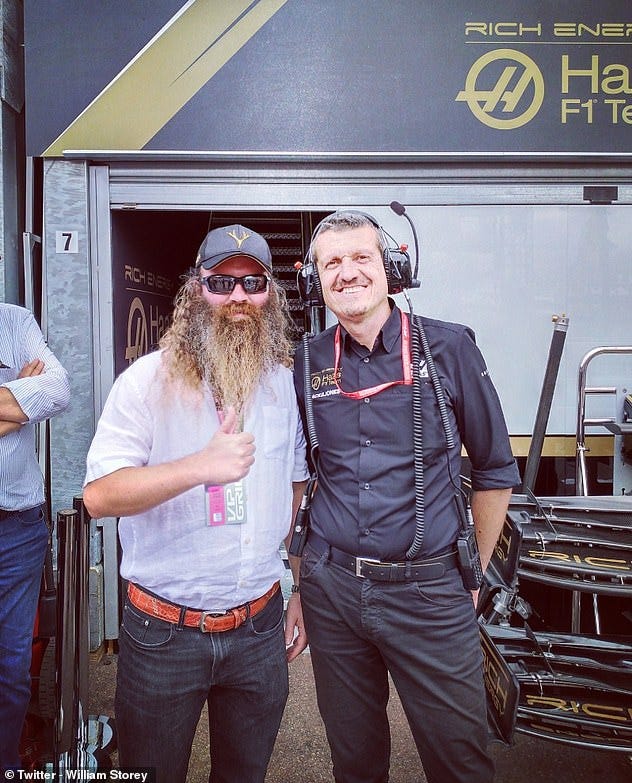Pain in the Haas
Perhaps this will be the lesson of our age:1 if a man2 promises the moon, the sun, and the stars, make him pony up at least a couple of celestial bodies whose ownership you can verify before you commit. George Santos3 is the most recent example — but by the time I hit publish on this piece, there will likely be another emperor discovered sans culottes, which only offers more proof that the last ten or 15 years are marked by the sheer number of Trumps, Santoses, and Bankman-Frieds who have risen to lofty heights on scaffolds of lies, misdirection, and more lies.
That isn’t to say there haven’t always been con men. I mean. Come on. But the speed at which information now moves and the sheer amount of money sloshing around makes it easier than ever to build imaginary wealth and to have the truth revealed. It’s both a feature of our connected age and a bug.
One of the biggest money sloshers is Formula 1,4 which means flim-flam peddlers and snake oil salesmen find their way there like swallows returning to Capistrano. Witness Force India. Marvel at Team Lotus. Boggle at Moneytron.5 Where cash is king, fraudsters abound.
Which makes it so strange that teams keep falling for the con. I mean, yeah — some of that is willful blindness and a straight-up money grab. If you are being promised the moon, etc., you want to believe that you’ll get them. That can’t be the entire reason these scams keep happening, tho.

Elizabeth Blackstock and Alanis King poke at the “how does this happen” question in Racing with Rich Energy: How a Rogue Sponsor Took Formula One for a Ride. With this exhaustively reported book, the pair do their best to get to the bottom of the Rich Energy partnership with F1’s Haas team.6 It’s a noble effort and one that totally fails in a couple of different ways.
It’s not for lack trying. Blackstock and King are very, very good at finding and verifying information. Both have been on this beat for a long time and broke a bunch of the Rich Energy story when it first started falling apart. Both, too, are getting all kinds of praise for being something not often seen in Formula 1: young, knowledgeable, and vocal women who have a platform.

I come not to bury the writers’ ability but to point out that their task was an impossible one. Absolutely no one was going to give them accurate information on the record. Any human who had any clear visibility into the Haas/Rich Energy deal was going to give a “no comment” because too many NDAs and career blacklists exist. So the writers are forced to turn to court documents, tweets, and bank records. While the volume of data they find is truly impressive, little is particularly revealing. You need more human intel to figure out what is signal and the noise in the numbers.
The pair continually come up against one of the main brick walls in reporting that no one warns you about enough in J-school. 7 If you can't get anyone to talk to you, your story isn't a story.8 It's just a bunch of disjointed tidbits that will never hang together in any satisfying narrative.
Even the best writers struggle when faced with main subjects who won’t talk. But they are usually able to get around that by talking to literally dozens of other people who will. Patrick Radden Keefe is one of those writers — and his profile of Mark Burnett is a great example of how you get around, over, and through that wall. Blackstock and King had none of that co-operation from other parties. The quotes they do have are more anodyne than enlightening.
Racing with Rich Energy becomes a collection of receipts. The biggest questions never get answered. Did anyone in Haas, which clearly has a legal team, do any research on Storey? Where did his money come from, if it existed at all? How did he weasel his way onto such a big stage? There are hints in here but nothing concrete.
Ultimately, this book lays out a game plan for reporters — I hope it’s King and Blackstock again — to pick this up in ten years, provided we still have things like books and race cars and money in a decade. By then, more people will be able to speak freely and we can get a better idea how this all actually happened. We’ll probably be too distracted by the high profile fraud of that particular year, mind, to really learn our lesson from the past. But I can dare to dream.
Quickly:
I got sucked into HBOMax’s The Climb on Monday. It’s not immediately griping TV but it is interesting enough, if only because I’ll watch just about anyone who is really good at what they do do that thing. What sticks out to me the most9 is how the producers found a diverse cast of athletes to compete, which helps to reinforce that the outdoors is for everyone. A push for equity in access to outdoor spaces and activities has been going on for years now and it's great to see it embraced here. If you are in the mood for scenic vistas and watching people haul themselves up same, check it out.
Lesson of a past age: never start a land war in Asia
it’s almost always a man. There are exceptions — I’m looking at you Elizabeth Holmes — but they are few and far between.
The NYT’s Vanessa Friedman wrote a great piece about the importance of clothing/costume when it comes to committing fraud. Related: I wonder if Avery Trufelman has seen it?
As you know, Bob, I’m a big fan of F1 thanks to Drive to Survive and 50+ years of hearing my father talk about it. I could not care less about the engineering and mechanics and aerodynamics. I’m just in it for the drama (and Toto Wolf.)
It’s tempting to mention the Mazepins among the fraudsters but it doesn’t quite work. Their money is actual and technically legally obtained, if morally and ethically abhorrent.
Drive to Survive Season 2 Episode 2 is a primer on what happened. In short: Haas the racing team took on Rich Energy, an energy drink company, as a sponsor. It gets weird.
Another pitfall that needs to be covered more in J-school is how long you spend waiting for someone to call/email/text you back. It is maddening — and it’s hard to not slowly become Glenn Close’s character in Fatal Attraction, the one who responded to being ignored by boiling a family pet. As a reporter, you will be ignored. A lot. Cultivate a hobby.
And that the ones who won’t talk are the first to complain that no one wants to hear their side, despite the fact that they won’t share their side on the record. Back in the day when I used to do this for a living, most of my anger was saved for the people who’d say “no comment” to me and “the media won’t tell you what really happened” in public. Asssholes.
Apart from the obvious, which is that rock climbing looks really fucking hard, yo.




